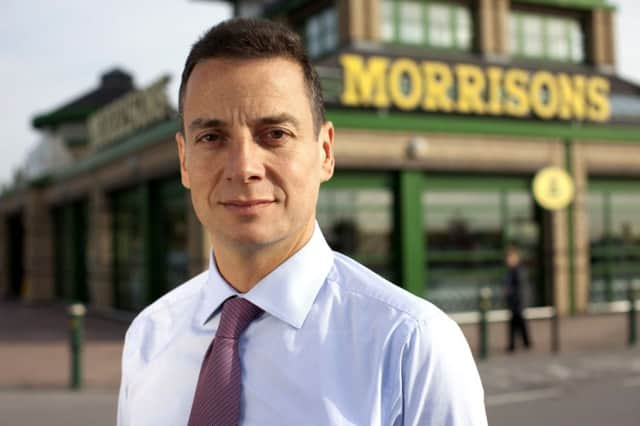Morrisons boss talks tough as group slides into red


The under-pressure boss plans to invest £1 billion over three years to improve value and “defend and strengthen our competitive position”, using savings on procurement, systems and other costs. It comes as the group continues to be squeezed by much smaller, but rapidly growing, discount rivals Aldi and Lidl.
Full-year results published yesterday revealed a bottom-line loss of £176 million after exceptional costs of £903m from write-downs on the value of its stores and the planned sale of its poorly-performing children’s wear offshoot Kiddicare.
Advertisement
Hide AdAdvertisement
Hide AdShares tumbled 12 per cent to 205.2p after investors were also rocked by a warning that underlying profits – before one-off items – would drop by more than half to £325-£375m for 2014-15. They fell 13 per cent to £785m in the latest results.
Fellow sector heavyweights Sainsbury’s and Tesco also came under pressure amid renewed concerns of a price war, with its potential to hit profits. Analysts at brokerage Jefferies said the scale of Morrisons’ price investment was equivalent to “getting the bazooka out”.
Philips who succeeded Marc Bolland, now boss at Marks & Spencer, in 2010, said: “We are going to lower our prices on a permanent basis. The biggest challenge that we face is that there has been a fundamental change in how consumers view discounters.
“They are no longer going to them out of necessity. The perception has changed and there is a new price norm.”
Meanwhile, a shift in focus to grow convenience stores and its online operation – the latter belatedly launched just eight weeks ago – will see the pipeline of new supermarkets slow to a trickle. After 2015-16, they will only be built in exceptional circumstances.
The group will also sell off £1bn of its £9bn property portfolio by 2016-17, including a small number of stores. This will include £400-500m of disposals in the current financial year.
But the vast majority of its estate will remain in the hands of the company on a freehold basis, despite calls by some activist investors for a more radical sale-and-leaseback shift.
The results, spanning the year to 2 February, showed that total turnover fell 2 per cent to £17.7bn, with underlying sales at stores open for more than a year down 2.8 per cent.
Advertisement
Hide AdAdvertisement
Hide AdA final dividend of 9.2p was proposed, pushing the total payout for the year up 10 per cent to 13p, in line with guidance.
Richard Hunter, head of equities at Hargreaves Lansdown stockbrokers, said “not all is doom and gloom” with the roll-out of online and convenience stores under way and the double-digit hike in the group’s dividend.